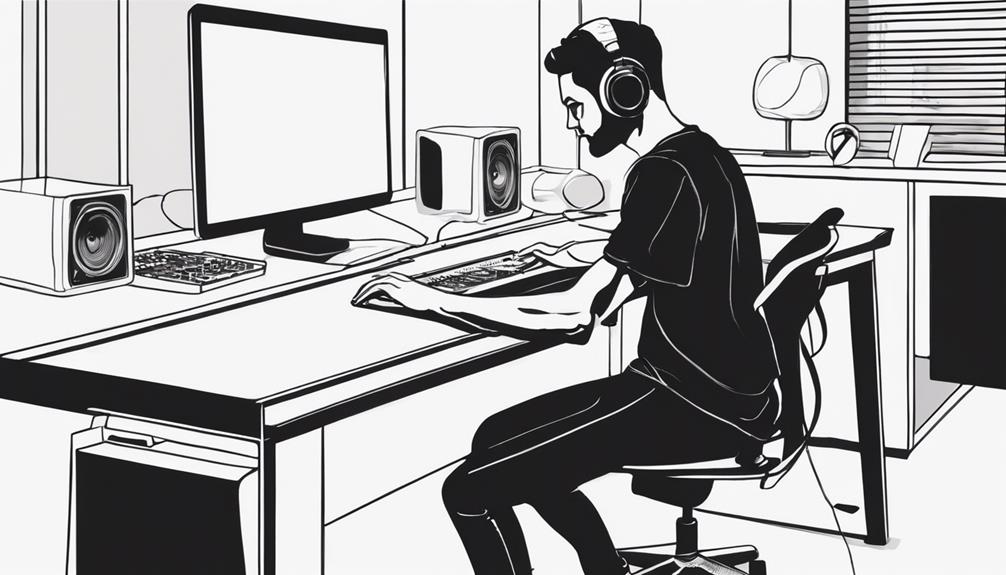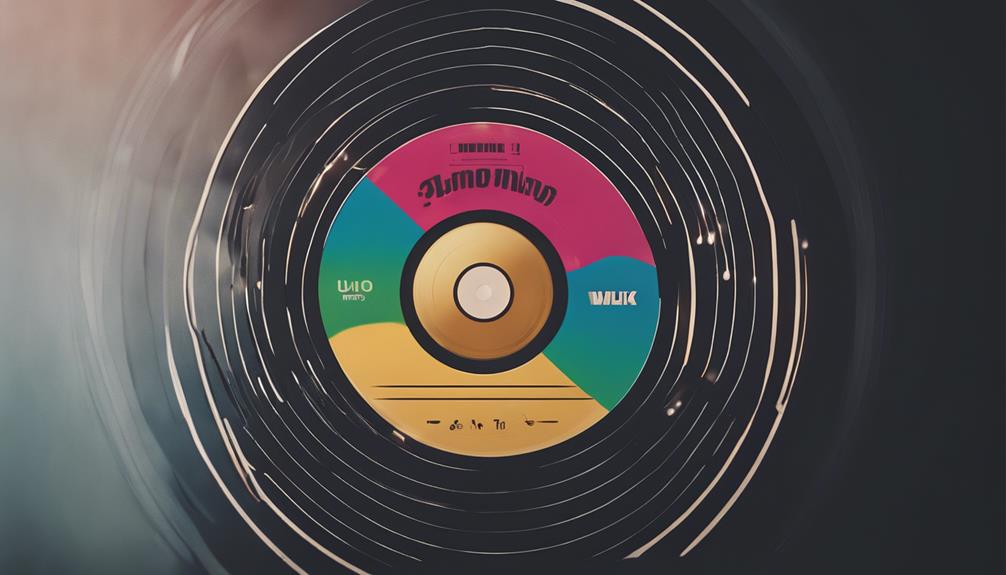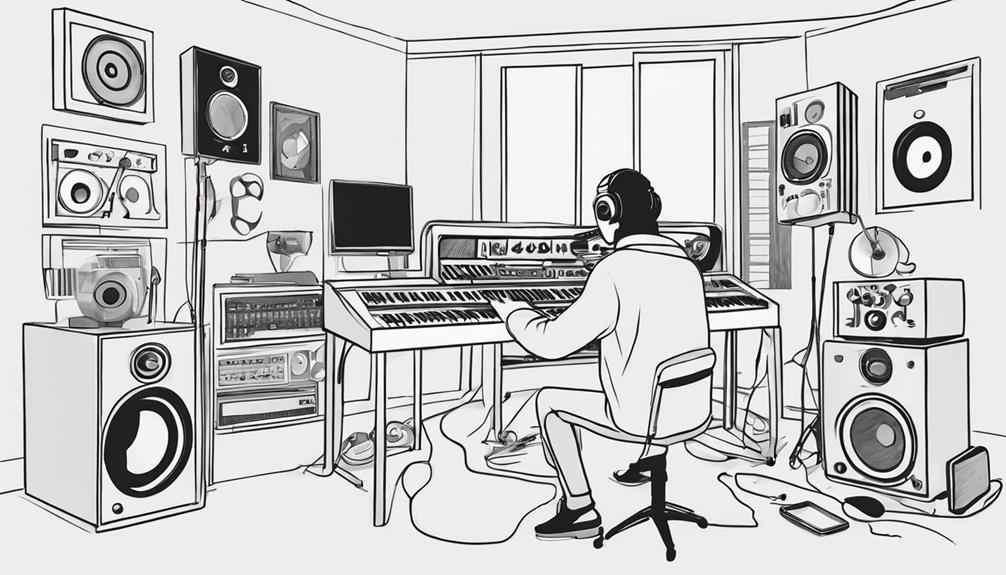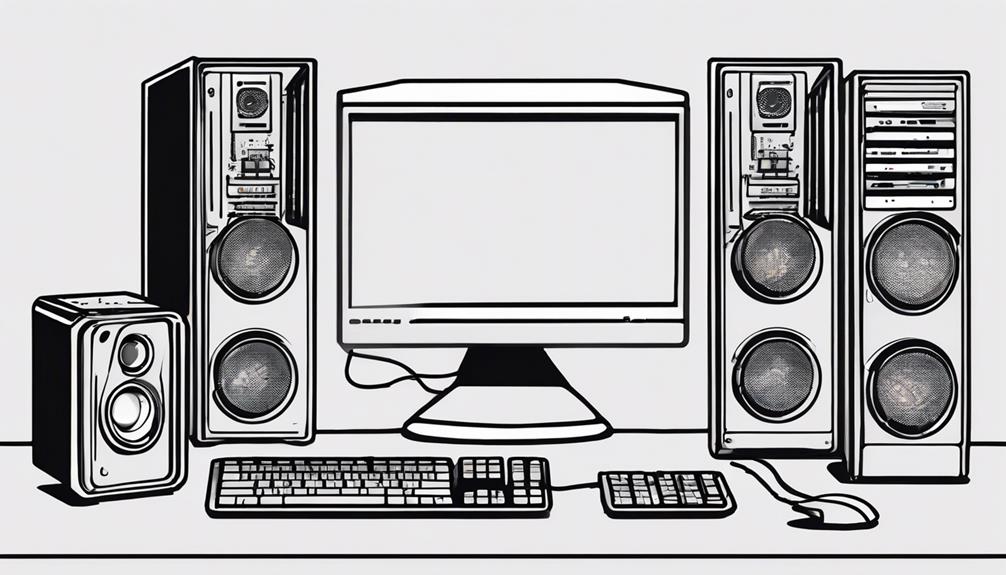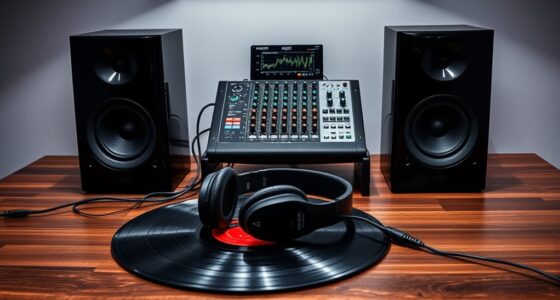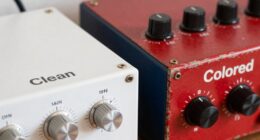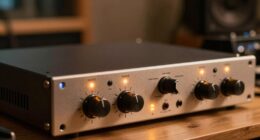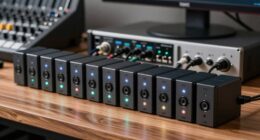Start by creating a calm workspace with ample room and good lighting. Try out digital audio workstations like Ableton Live or Logic Pro to tap into your creativity. Learn basic music theory for rhythms and melodies. Invest in a computer, DAW software, and quality equipment like microphones. Collaborate with musicians and learn from them to grow your skills. These steps will set you on the path to music production success. Happy creating!
Key Takeaways
- Set up a dedicated workspace with good lighting and acoustic treatment.
- Choose a DAW like Ableton Live or Logic Pro for MIDI sequencing and audio recording.
- Learn basic music theory for rhythm, melody, and harmony understanding.
- Invest in essential equipment like a computer, DAW software, and studio monitors.
- Collaborate with professionals, join communities, and seek feedback for skill growth.
Setting Up Your Music Production Workspace
Choose a quiet, well-lit room with ample space for your equipment and instruments when setting up your music production workspace. This space should accommodate your studio monitors, digital audio workstation (DAW), audio interface, and other essential gear. Guarantee proper workspace organization by organizing cables neatly to prevent tangling and optimize your workflow. Consider incorporating acoustic treatment such as soundproofing panels and bass traps to enhance sound quality and minimize unwanted noise interference.
To create a conducive environment for creativity, personalize your workspace with inspiring decor, comfortable seating, and good lighting. These elements can contribute to your overall mood and productivity when producing music. Additionally, well-placed lighting not only enhances the ambiance but also aids in reducing eye strain during long hours of work.
Exploring Digital Audio Workstations (DAWs)
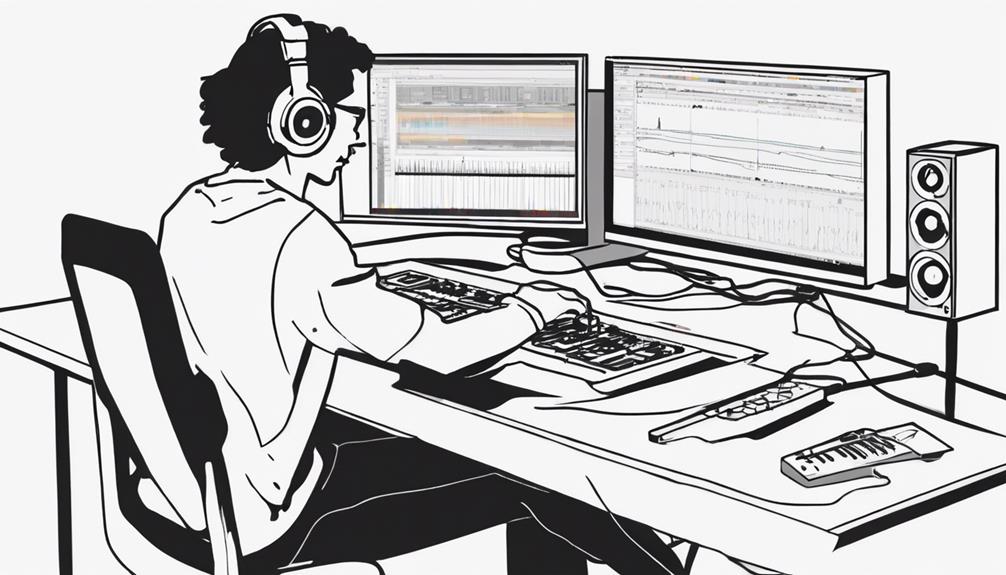
Discover the world of Digital Audio Workstations (DAWs) to explore deeply into the heart of music production, where creativity meets technology. DAWs like Ableton Live, Logic Pro, Pro Tools, FL Studio, and Studio One serve as versatile platforms for all your music-making needs. These software tools offer features for MIDI sequencing, audio recording, and integrating virtual instruments and effects into your projects. With DAWs, you can enhance your music through flexible track arrangements, automation, and a variety of plugins.
Each DAW has its strengths, catering to different production styles. Ableton Live is known for its live performance capabilities, while Logic Pro is favored for its wide range of virtual instruments and effects. Pro Tools stands out in professional studios for its advanced editing and mixing features, and FL Studio is popular among electronic music producers. Studio One offers an intuitive workflow ideal for beginners.
Start exploring these DAWs to find the one that resonates with your creative process and watch your music production skills soar.
Understanding Basic Music Theory
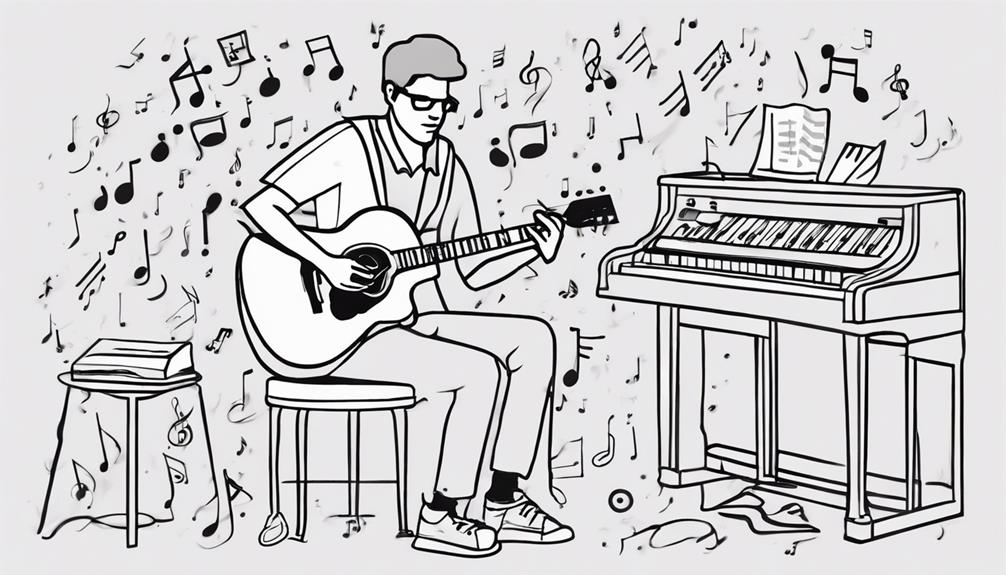
Explore the foundations of music creation by grasping the essentials of basic music theory. Basic music theory encompasses vital elements like rhythm, melody, harmony, and scales. Understanding note values, time signatures, and musical intervals is essential to delving into the world of music theory. By learning about chord progressions, key signatures, and musical structure, you gain insight into how these components interplay to form a cohesive musical piece.
Rhythm dictates the movement and flow of music, while melody provides the tune that listeners hum along to. Harmony adds depth and richness through the combination of different notes played simultaneously. Scales lay the groundwork for creating melodies and harmonies by establishing a set of notes to work with. Knowing about note values, time signatures, and musical intervals aids in crafting well-structured compositions.
Ultimately, mastering basic music theory enhances your ability to compose, arrange, and produce music with skill and creativity.
Investing in Essential Equipment
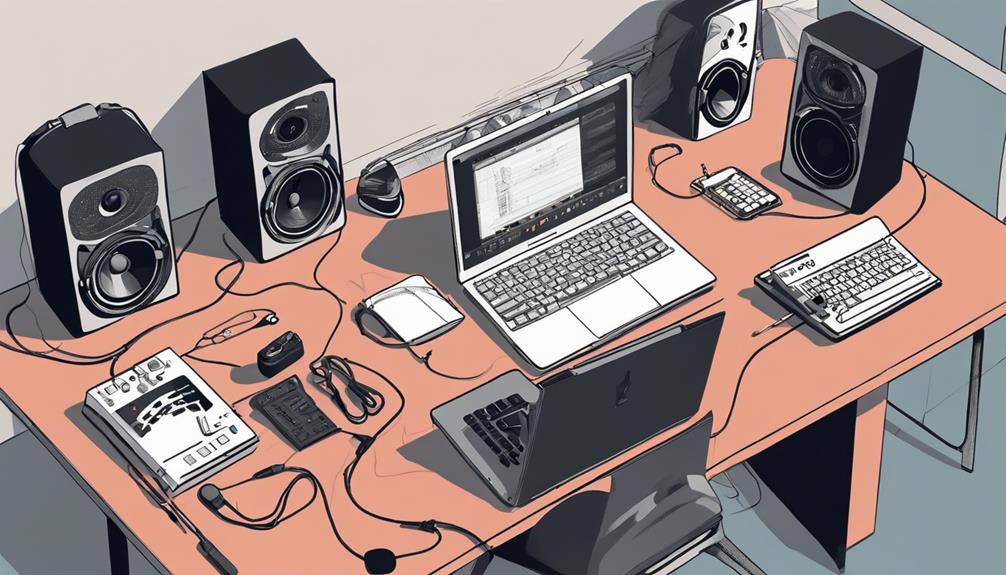
To begin your music production journey effectively, ensuring you have essential equipment like a computer, DAW software, audio interface, microphones, and studio monitors is indispensable. Each piece plays an essential role in the recording, editing, and mixing stages of your production workflow, ultimately contributing to high-quality audio output.
Here's why each item is essential:
- Computer: Acts as the hub for your music production, running software and storing your projects.
- DAW Software: Enables you to record, edit, and mix your music efficiently in a digital environment.
- Audio Interface: Connects your microphones and instruments to your computer, ensuring high-quality sound input.
- Studio Monitors: Provide accurate sound reproduction for precise mixing and mastering.
Investing in reliable equipment not only enhances your overall production experience but also leads to better results. Remember to set up and maintain your gear properly to optimize performance and streamline your music production process.
Collaborating and Growing Your Skills
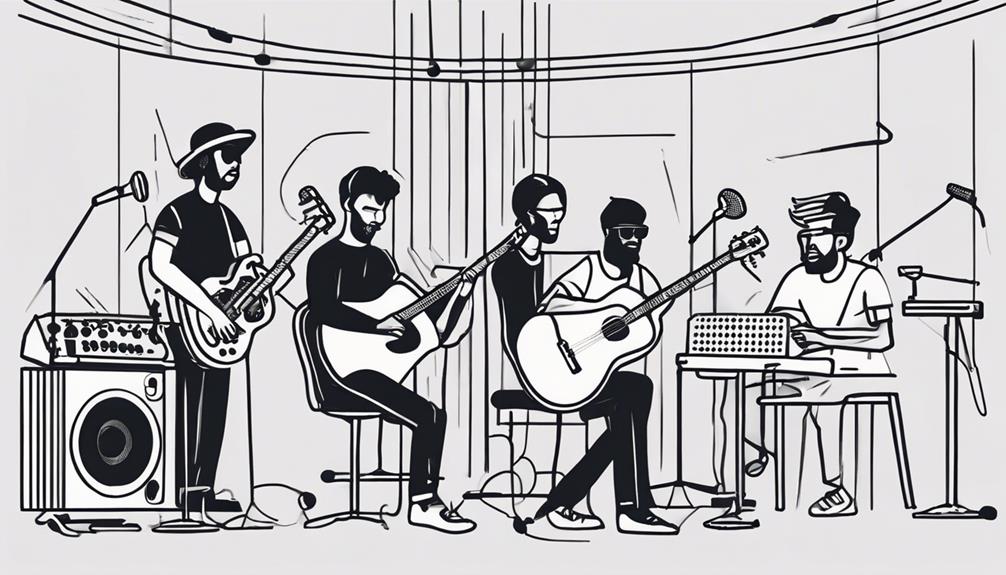
Engage with fellow musicians and industry professionals to enhance your music production skills and expand your creative horizons. Collaborating with others allows you to learn new techniques, styles, and approaches that you may not have discovered on your own.
Joining online communities or forums can provide a platform to share knowledge, seek feedback, and network with like-minded individuals. Attending workshops, masterclasses, or music production courses is a great way to enhance your skills and connect with industry professionals who can offer valuable insights and opportunities.
Participating in music production challenges or competitions can push your creative boundaries and give you exposure to different genres and trends. Seeking feedback from peers, mentors, or online platforms is essential for improving your music production skills and growing as a producer.
Frequently Asked Questions
How to Begin Music Production?
To start music production, begin by learning music theory, experimenting with genres, practicing instruments, and mastering production tools. Connect with musicians, seek mentorship, and stay updated on industry trends. Build your skills through practice and collaborations. To further enhance your journey, focus on developing a unique sound that reflects your artistic vision and resonates with your audience. Additionally, research online tutorials and courses that break down how to start music production step by step, helping you gain confidence with the technical aspects. Remember, persistence and creativity are key as you navigate this exciting and ever-evolving field.
Is It Too Late to Start Music Production?
It's never too late to start music production! Many successful producers began later in life. Age doesn't limit learning. With online resources and technology, you can begin at any age, bringing unique experiences to your work.
Where Do I Start When I Want to Make Music?
Start by choosing a music genre. Experiment with software like Ableton Live. Invest in equipment like a computer, audio interface, microphone, headphones. Explore online tutorials, courses. Collaborate for feedback and inspiration. Begin your music journey today!
How to Produce a Song With No Experience?
To produce a song with no experience, start by experimenting with music software and basic tools. Create simple melodies and beats using virtual instruments and samples. Watch tutorials, collaborate with others, practice regularly, and learn from mistakes to improve.
Conclusion
So, now that you've got your workspace all set up and your DAW chosen, it's time to immerse yourself in the world of music production.
Remember, music theory is your friend, equipment is your ally, and collaboration is your secret weapon.
With dedication and creativity, you'll be churning out bangers in no time.
So go forth, young producer, and make some magic happen!

